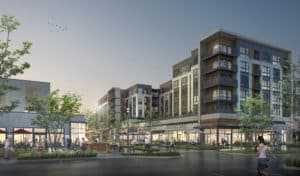
Woburn officials in June approved developer Edens’ plans for a 350-unit apartment complex as the Woburn Mall is redeveloped into a mixed-use center known as Woburn Village. Image courtesy of Edens
Five years ago, this column delivered hopeful news about the Smart Growth Zoning and Housing Production Act, codified as Chapter 40R of the Massachusetts General Laws. Now is a good time to evaluate this statute’s performance in producing new housing.
Chapter 40R encourages municipalities to establish smart growth zoning overlay districts near public transit facilities and town centers, allowing higher density residential developments as of right without zoning relief. Unlike Chapter 40B of the Massachusetts General Laws, which lets developers disregard zoning restrictions in municipalities that have insufficient low- and moderate-income housing, Chapter 40R empowers municipalities to direct high-density developments to better-suited locations.
How 40R Works
The Massachusetts Department of Housing and Community Development (DHCD) regulates smart growth zoning programs. The location and size of smart growth zoning districts must satisfy DHCD’s numerous regulations. The zoning amendments need to meet density and “affordability” requirements. Housing density in proposed districts must allow at least eight units per acre for single-family dwellings, 12 units per acre for two- and three-family dwellings and 20 units per acre for multi-family dwellings. At least 20 percent of these units must be “affordable housing” – that is, price-controlled housing for families earning less than 80 percent of area median income. DHCD’s website contains helpful information for interested municipalities, including sample zoning bylaws, application forms, and concise explanations of Chapter 40R’s mechanics.
Chapter 40R offers modest financial incentives to municipalities that create smart growth districts. Upon adopting a smart growth zoning bylaw, municipalities qualify to receive one-time zoning incentive payments, based on the number of additional housing units allowed as of right in the smart growth district. These payments are at least $10,000 and can be as high as $600,000 for smart growth districts allowing over 500 additional housing units.
Chapter 40R also provides participating municipalities with one-time density bonus payments of $3,000 per housing unit upon issuance of building permits, and it requires some state agencies to favor participating municipalities when awarding discretionary funds. Massachusetts General Laws Chapter 40S, a companion statute to Chapter 40R, creates a reimbursement plan covering increased public school costs that municipalities incur when children reside in housing created by smart growth zoning.
40B Produces Many More Units
The nonprofit Citizens’ Housing and Planning Association (CHAPA) regularly monitors housing construction in Massachusetts. According to a CHAPA report issued in 2018, about $20.2 million in zoning incentive and bonus payments had been paid to municipalities under Chapter 40R, with an additional $2 million paid under Chapter 40A to reimburse increased school costs.

Christopher R. Vaccaro
As of 2014, 35 cities and towns had adopted smart growth zoning, covering over 1,600 acres on which nearly 13,000 dwelling units could be built as of right. Building permits had been issued for nearly 2,500 smart growth dwelling units. This seemed like auspicious news at the time; however, Chapter 40R has underperformed since then.
According to DCHD records, 42 cities and towns have now adopted smart growth zoning, covering over 2,300 acres which can accommodate 22,213 dwelling units. But so far only about 3,750 dwelling units have been built or permitted, an increase of about 1,250 units since 2014.
This means that Chapter 40R is adding 250 units of housing per year at best. In comparison, according to CHAPA’s report, over 20,000 homes were produced in Massachusetts under Chapter 40B permitting during the 10-year period from 2007 to 2017. Chapter 40B’s production of 2,000 units per year dwarfs Chapter 40R’s production.
No Production in Some Districts
Another area of concern involves municipalities that adopted smart growth zoning and accepted zoning incentive payments but failed to create any housing in the districts within three years. As of last year, five cities and towns fell into this category.
Under Chapter 40R, DCHD must require municipalities to return zoning incentive payments if construction does not start within three years, but so far DHCD has refrained from doing so.
On a more positive note, several communities, including Amesbury, Reading, Fitchburg, North Reading, and Rockland, have successfully used smart growth zoning to enable the construction of hundreds of dwelling units.
As Massachusetts struggles with high housing costs and low vacancy rates, the state legislature should acknowledge Chapter 40R’s shortcomings and consider changes to zoning and other land use laws to promote multi-family housing production.
Christopher R. Vaccaro, Esq. is a partner at Dalton & Finegold, LLP in Andover. His email address is cvaccaro@dfllp.com.






